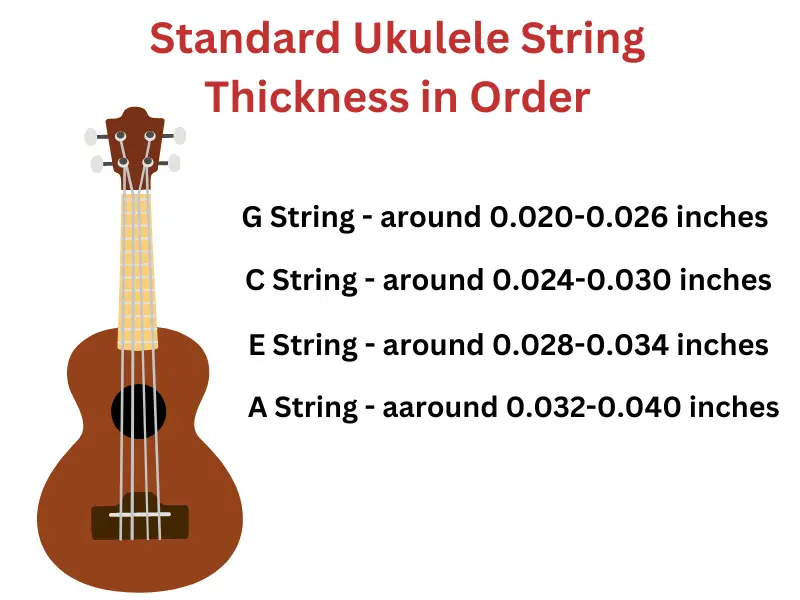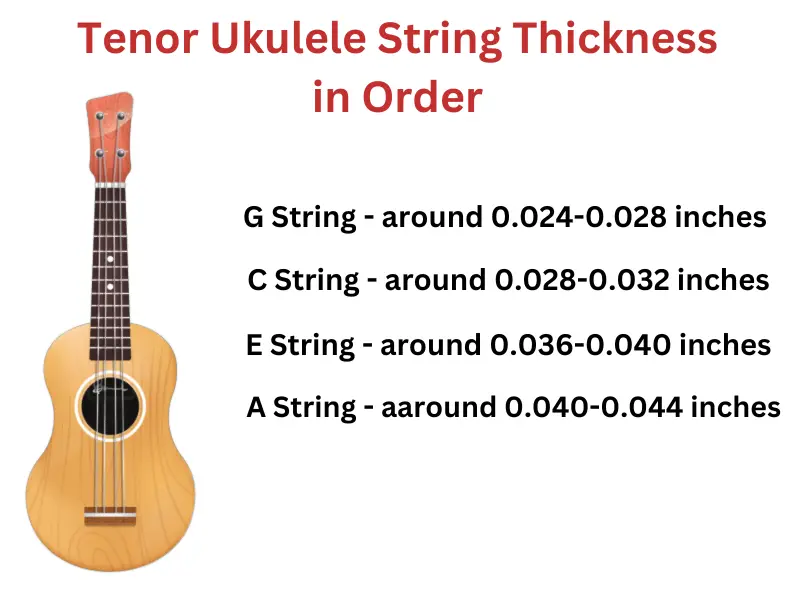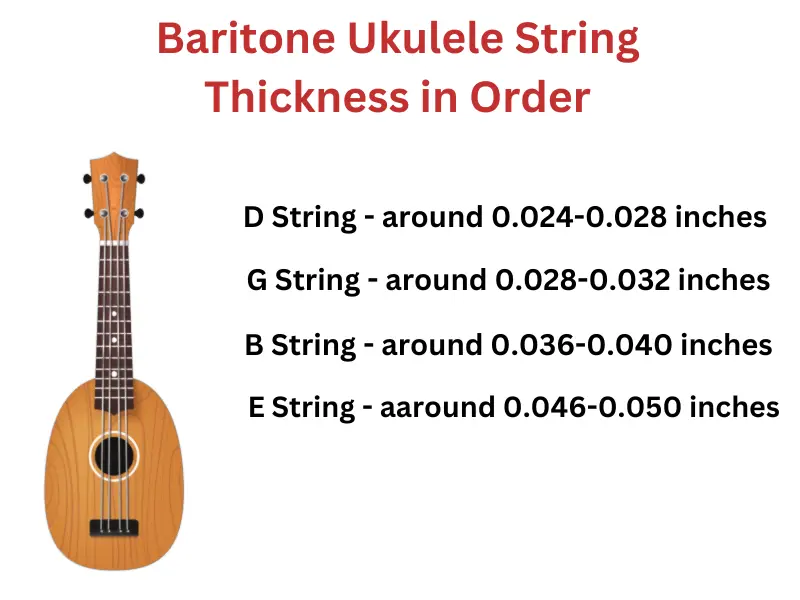People always ask me are Ukulele Strings all the same thickness? Well, the short answer to this question is no, ukulele strings are not all the same thickness. Like guitars, all 4 strings are of different thicknesses in ukulele.
In fact, the thickness of all 4 strings of ukulele strings varies from size to size and model to model. You can use different thickness strings than the standard for your ukulele.
Changing to different thicknesses have its own unique benefits and drawbacks.
In this guide, I will walk you through standard ukulele string thickness to all other types of ukulele strings thickness.
If you are planning to buy new strings for your ukulele then reading this guide would be quite beneficial to you.
First off,
Contents
- Standard Ukulele String Thickness in Order (Concert and Soprano Ukulele)
- Tenor Ukulele String Thickness in Order
- Baritone Ukulele String Thickness in Order
- Left Handed Ukulele String Thickness Order
- What Are Ukulele Strings Made Out Of?
- Do Ukulele Strings Break Easily?
- How Long Do Ukulele Strings Last?
- Bottom Line
Standard Ukulele String Thickness in Order (Concert and Soprano Ukulele)

The standard ukulele strings thickness is as follows,
Disclosure: This post may contain affiliate links, which means we may receive a commission if you click a link and purchase something that we recommended. Read more about Affiliate disclosure here.
- G String – It is the highest-pitched string on your ukulele. It is usually made from fluorocarbon or nylon. The thickness of this string is around 0.020-0.026 inches.
- C String – C string is the second highest pitched string on your ukulele. It is also made from fluorocarbon or nylon. It has a standard thickness of around 0.024-0.030 inches.
- E String – It is generally made from wound metal or fluorocarbon but plastics are commonly available these days. This string has a thickness of around 0.028-0.034 inches.
- A String – This one is the lowest-pitched string on your ukulele It is also made from plastic, wound metal or fluorocarbon. It has a thickness of around 0.032-0.040 inches.
However, above is the standard thickness of ukulele strings, you may find slightly different thicknesses which depend on the manufacturer and the material.
The standard ukulele strings are mostly used in soprano and concert ukulele. For other sizes, the thickness is different which is described in the below sections.
So, read on.
Tenor Ukulele String Thickness in Order

Tenor ukulele strings thickness is as follows,
- G String – This is the highest pitched string on tenor ukulele. This string is usually made from fluorocarbon or nylon or even from plastic in low quality ukuleles. It has a thickness of around 0.024-0.028 inches.
- C String – This one is second highest pitched string on a tenor ukulele. It is also made from same material like G string. The thickness is around 0.028-0.032 inches.
- E String – This string is made from wound metal, plastic or fluorocarbon. The thickness is of around 0.036-0.040 inches.
- A String – It is the lowest pitched string on a tenor ukulele. It is made from plastic, wound metal or fluorocarbon. The thickness is around 0.040-0.044 inches.
Note: The thickness may be slightly different for different manufacturers and the materials used.
Baritone Ukulele String Thickness in Order

As you know, Baritone ukulele has different tuning, ie; DGBE. So the thickness will be definitely different than standard ukulele size.
Let’s find out the thickness of strings for Baritone ukulele in order.
- D String – D string is the highest pitched string on baritone ukulele. It is generally made of wound metal or fluorocarbon. The thickness of this string is around 0.024-0.028 inches.
- G String – It is the second highest pitched string on your baritone ukulele. It is made from wound metal or fluorocarbon. The thickness is around 0.028-0.032 inches.
- B String – B string is the second lowest pitched string in baritone ukulele. It is made from plastic, wound metal or fluorocarbon. It’s thickness is around 0.036-0.040 inches.
- E String – It is the lowest pitched string in baritone ukulele. This string is made from plastic, wound metal or fluorocarbon, with a thickness of around 0.046-0.050 inches.
Left Handed Ukulele String Thickness Order
If you are left handed and want to change your strings then you can follow the below points. However, you must know that the thickness is same for the right-handed ukuleles.
So, I am only giving here the order according to thickness.
- High G String – Thinnest
- C String – 2nd thinnest
- E String – 2nd thickest
- A String – Thickest
What Are Ukulele Strings Made Out Of?
There are several materials used to make ukulele strings. Even the animal gut. However I am sharing here some most common materials.
- Nylon – Nylon is the most popular material to make for ukulele strings. It is commonly used for the high G and C strings. The reason of using nylon because it produces a bright, clear sound in low manufacture costing.
- Fluorocarbon – Fluorocarbon is another popular material used to make ukulele strings. Fluorocarbon is used for its brightness and sustain in the sound. Fluorocarbon is more durable than nylon and doesn’t break often.
- Metal – Metal strings are also used for the lower pitched E and A strings. These strings are made from materials like steel or bronze. They produce warm and rich sound like guitar. But metal is not a common material for ukulele strings. Because most ukuleles don’t have truss rods and the tension metal string produced could break the ukulele. Metal strings are generally used in bigger size ukuleles with truss rods.
- Synthetic materials – These days most inexpensive ukulele strings are made from synthetic materials. Material like such as Nylgut is a blend of nylon and gut which is able to produce the traditional sound of ukulele without using gut.
- Plastic – Plastic is another popular material for inexpensive ukulele strings. It is quite cheap and even produces great sound. That’s why you’ll find them in most cheap ukuleles.
Do Ukulele Strings Break Easily?

Ukulele strings are made from different types of materials, from fragile to durable.
If your ukulele strings are made from Fluorocarbon or metal then it would last long.
But, Nylon and synthetic strings are not so durable. They can break easily. Even if you use guitar picks on these materials they could break.
So. it all depends on the material used in your ukulele strings, whether they break easily or not.
The durability of strings also depends on the type of playing such as if you are using picks or frequently using playing techniques such as hammer-on etc then chances are your ukulele strings could break.
How Long Do Ukulele Strings Last?
It all depends on your playing style and the materials used in the strings that how long they can last.
If your ukulele strings are made of Fluorocarbon or metal then they can long last yer after year.
But most of the ukulele strings are made of nylon or synthetic materials which actually don’t long last.
Even if you handle your ukulele with care, they can easily last for a few months and even years.
So, there is not a st of rules how long do ukulele strings last. It all depends on the material used and your playing style.
Bottom Line
So, I hope you have got your answer to the question, are ukulele strings all the same thickness?
I have also given some other useful knowledge about ukulele strings that can help you to choose the right strings for your ukulele.
If you liked this guide then share this with others on social media and if you have any queries about ukulele then the comment box is waiting for you.
Happy ukulele playing.
